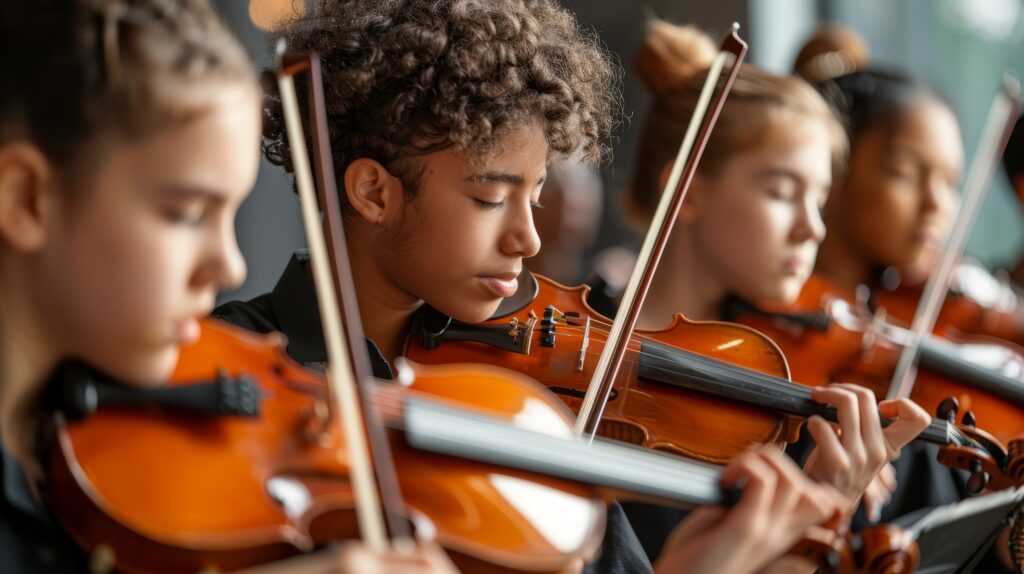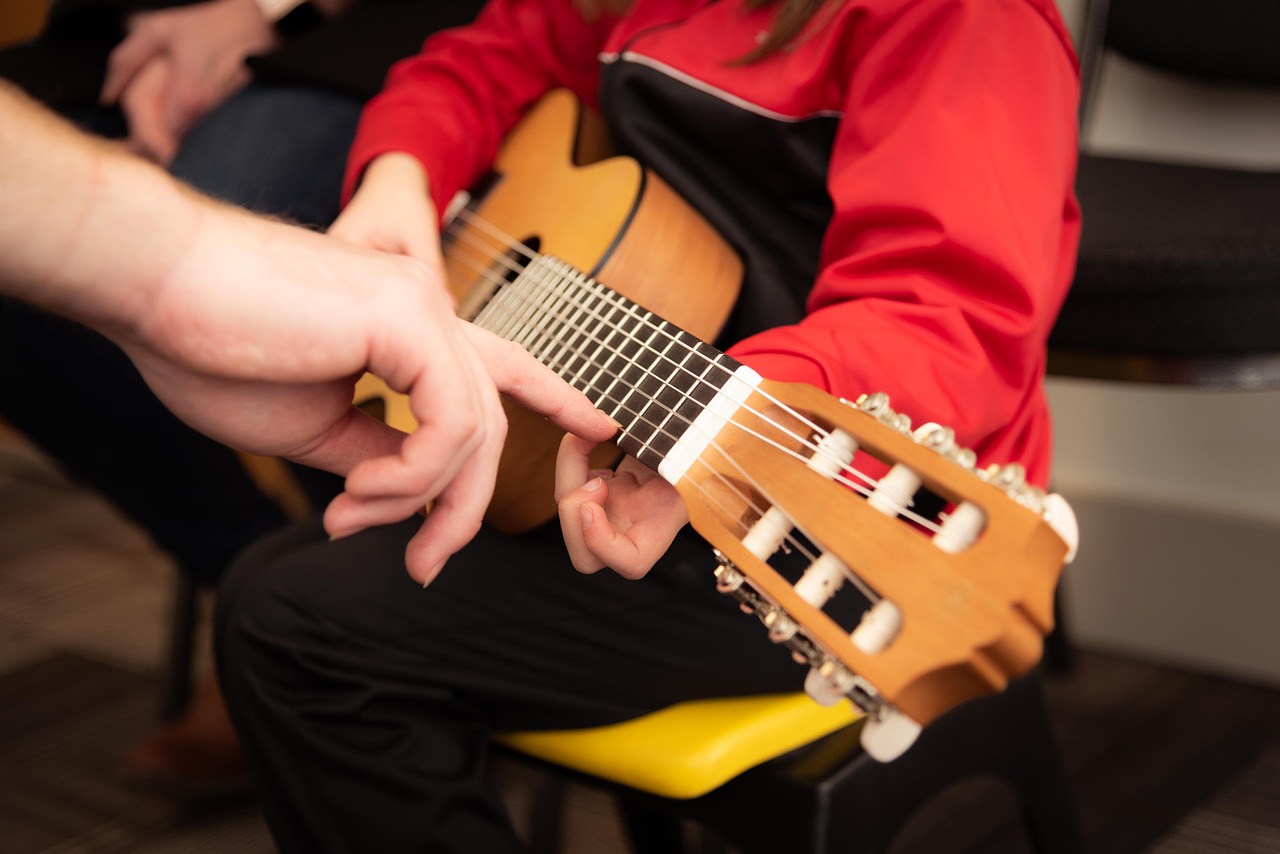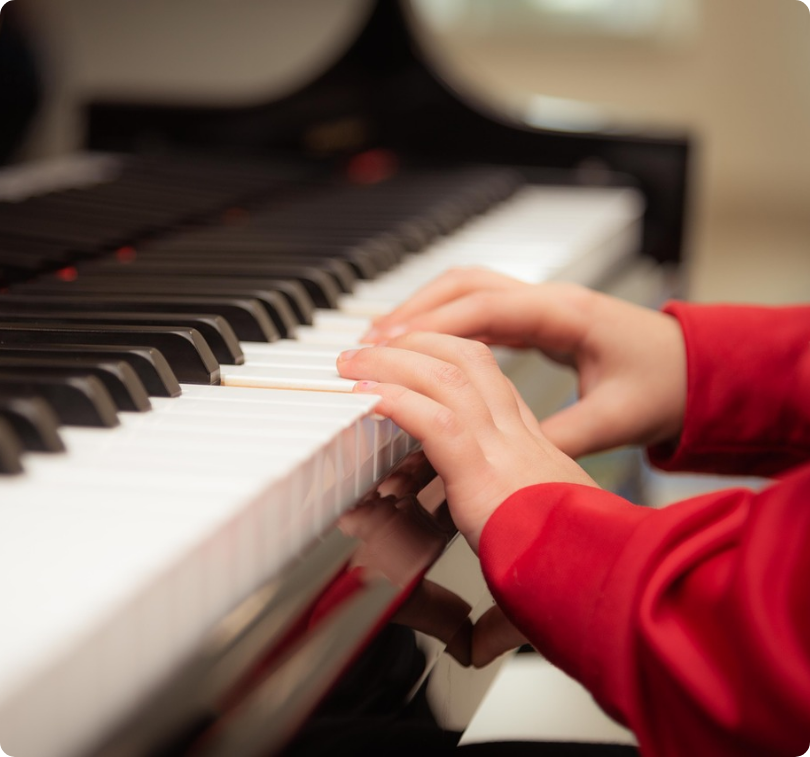Theme 1: Music education has an impact on society
Music education promotes equality, well-being and inclusion. It supports life and learning skills, brings together diverse people and builds a sustainable future. Accessible and diverse music education is an important part of the Finnish education system and society.
Areas of the theme
Future-proof music teaching is diverse, accessible and safe
Music education develops life skills and promotes wellbeing
Music education is a significant and inseparable part of Finnish society

“
Everyone has access to opportunities to make and study music in line with their personal goals, irrespective of their location and income level.
Proposals for action
Future-proof music teaching is diverse, accessible and safe
Diversity in music brings richness. Musical pursuits unite people from different backgrounds and cultures. There is no unnecessary pigeonholing and expertise can be combined across genre boundaries. Music education reinforces diversity and unity in music while respecting the particular characteristics of various instruments, ways of working and musical styles.
Everyone has access to opportunities to make and study music in line with their personal goals, irrespective of their location and income level. High-quality pedagogy is tailored for the unique character of each learner. Professionally skilled teachers inspire and coach their students without imposing limitations or boundaries.
Music education contributes to an ecologically, socially and culturally sustainable future. The safety of the learning environment and workplace, and respectful conduct towards every individual, are fundamental values in education. Respect for human rights, equality and non-discrimination governs the entire field of music education.
Proposals for action
1. Educational institutions shall collaborate and leverage digital technology in order to improve the availability and diversity of music education and to contribute to a sustainable future.
2. Educational organisations shall analyse their carbon footprints and reform their operations to make them ecologically sustainable.
3. Collaboration between educational institutions shall be pursued to ensure that funding based on regional demographics is conducive to the availability of basic education in the arts.
4. Actors in the music education field shall engage in continuous dialogue on shared professional ethics and create tools to help organisations in their work.
Music education develops life skills and promotes wellbeing
Education in music and the arts is seen as a fundamental right for children and an important part of growing up as well-balanced adults. Research findings on the impacts of musical activities on cognitive and socio-emotional development are widely applied at all levels of education. Music education is understood to be a key tool in fostering meta-skills that are needed in working life.
Professionally competent music education is provided in early childhood education and care and in preschool and basic education all over Finland. Musical activities are also widely brought into social welfare and healthcare services, for example in rehabilitation and services for the elderly.
Proposals for action
Education specialists shall make efforts to ensure that:
5. professionally competent music education is enhanced in early childhood education and care and in basic education.
6. everyone has the opportunity to participate in basic arts education, with a focus on music. The purpose of this is to ensure that everyone has the chance to acquire those meta-skills that are needed in working life and that music education can provide.
Music education is a significant and inseparable part of Finnish society
Every child has the fundamental right to learn music from early childhood onwards. Music is a major component of general education in Finland. Every child, adolescent and adult has the opportunity to pursue musical activities in accordance with their personal goals and ambitions.
Music education providers and decision-makers draw on music impact studies to develop of the field. In music education, curriculum design, the use of research findings and working life collaboration are geared towards equality and inclusivity for learners.
National and regional structures facilitate flexible integration between education and working life, across sectoral boundaries. Music and music education are more closely integrated into the wide range of public sector wellbeing services.
Proposals for action
7. Educational organisations and other actors in the field of music shall step up dialogue between education, scientific research, working life and political decision-making.
8. The societal impacts of music education shall be gauged through scientific research.
9. Music education actors shall actively take part in public debate and contribute to political decision-makers acquiring a greater awareness of the positive impacts of music education.
10. Music teaching in early childhood education and care, in both comprehensive and upper secondary schools, as well as in basic education in the arts – shall foster a network that links children, adolescents and families.

Kohti kestävää tulevaisuutta
Musiikkikoulutus luo ekologisesti, sosiaalisesti ja kulttuurisesti kestävää tulevaisuutta. Oppimis- ja työympäristön turvallisuus ja jokaista yksilöä arvostava käytös ovat koulutuksen perusarvoja. Ihmisoikeuksien, tasa-arvon ja yhdenvertaisuuden kunnioittaminen ohjaavat koko musiikkikoulutuskentän toimintaa.

Teemaan liittyviä kirjoituksia
No posts found.
Tule mukaan
Musiikkikoulutuksen tulevaisuus luodaan nyt



